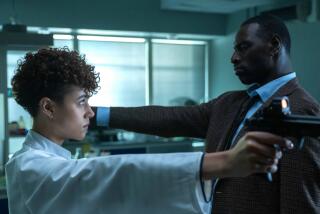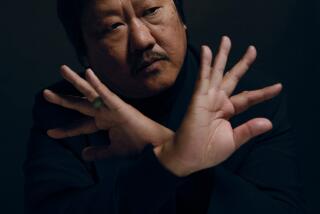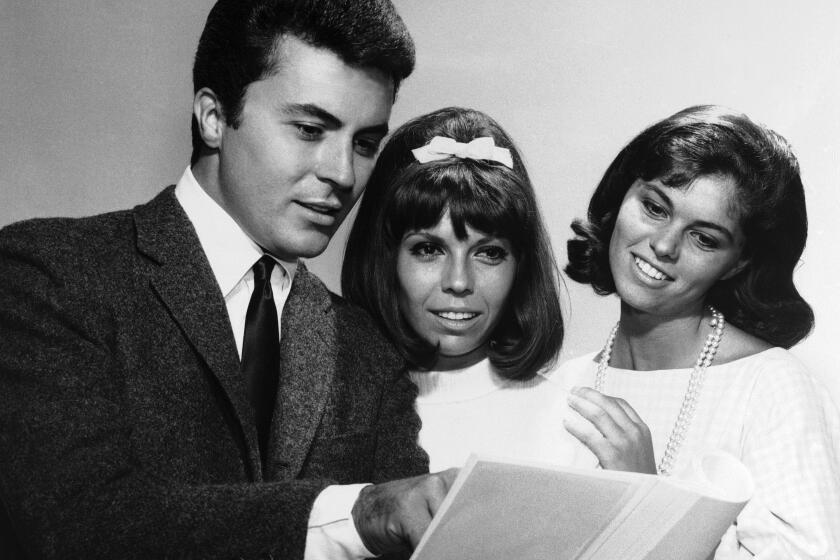Into the past of Wong Kar Wai
PRETTY BUT slight, “My Blueberry Nights,” the first English-language film by the revered Hong Kong auteur Wong Kar Wai, will seem both familiar and disappointing to many of his fans. This languid road movie, out on DVD Tuesday from Genius/Weinstein Co., recaps all the themes this filmmaker has long nurtured -- loss, longing, memory, regret -- but for the first time in his career, they seem less like obsessions than ingredients in a formula.
Those interested in Wong’s early evolution would do well to seek out Kino’s five-film box set, which covers the first decade of his career (minus 1994’s martial arts reverie “Ashes of Time”), from the brooding gangster love story “As Tears Go By” (1988) to the tempestuous breakup saga “Happy Together” (1997).
He made his name internationally with a trio of films directed in quick succession in the mid-1990s (all are in the Kino set). The first of these, “Chungking Express” (1994), is a clear precursor to “Blueberry”: Both are almost off-the-cuff quickies, made while on detours from more demanding projects and conceived as vehicles for pop stars who had never acted before (Faye Wong in “Chungking,” Norah Jones in “Blueberry”).
Championed in the States by Quentin Tarantino, “Chungking” established director Wong as the poster boy for Asian crossover pop and introduced a much-copied filmic vocabulary of romantic yearning: a pensive voice-over, dreamy slow motion, close-ups of fetishized details.
Its companion piece, “Fallen Angels” (1995), is even more brashly stylized. Set entirely at night and shot mainly in wide angle by Wong’s great cinematographer Christopher Doyle (who shot almost all of his films before “Blueberry”), this gangster nocturne is a dream of light and motion, an action painting in rain and neon.
Made on the eve of Hong Kong’s reversion to Chinese sovereignty, “Happy Together” is itself a movie about separation and renewal. Set on the other side of the world -- in Argentina, where its on-off gay lovers (Tony Leung and the late Leslie Cheung) have relocated -- it’s also a meditation on the difficulties of new beginnings, a theme that has proved increasingly central in Wong’s work. (Its first line, “We could start over,” is repeated throughout like a mantra, albeit one that neither the speaker nor the listener fully believes.)
Notorious for his improvisational approach, Wong has often started production with little more than an outline, sometimes dashing off an entire film in a matter of weeks but more often taking a seeming eternity and changing course as he proceeds.
Given how much tends to fall by the wayside -- subplots are written and even shot, only to disappear -- there is much potential for regeneration. A discarded plot strand from one movie becomes the basis for another. Actors reappear as older (or parallel-world) versions of their characters. His films exist as if in an echo chamber, or as layers of a palimpsest.
A through-line can be traced from his first major film, “Days of Being Wild” (1991, Kino), to his two best-known movies, the hothouse romance “In the Mood for Love” (2000, Criterion) and the maze-like reverie “2046” (2004, Sony). All are (at least partly) sensuous evocations of 1960s Hong Kong, a time and place that seem to exert an almost gravitational pull on his work.
Repetition always has been more of a plus than a minus with Wong. But by “2046,” the familiar tropes were starting to seem self-referential, even self-parodic. “My Blueberry Nights,” which follows Jones’ doe-eyed heroine from New York to California as she recovers from a bad breakup, is an attempt to shed his old habits that doesn’t quite succeed. Like all of his films, though perhaps inadvertently this time, it demonstrates how hard it can be to move on when the past isn’t through with you.
Still, the film has more than its share of ravishing moments. The first kiss between Jones and Jude Law’s cafe owner is simplicity itself: a few extreme close-ups, a lingering overhead shot, total silence. It’s a real time stopper, a reminder that even off his peak, there are some things this great romantic does better than almost any other filmmaker working.
More to Read
Only good movies
Get the Indie Focus newsletter, Mark Olsen's weekly guide to the world of cinema.
You may occasionally receive promotional content from the Los Angeles Times.









